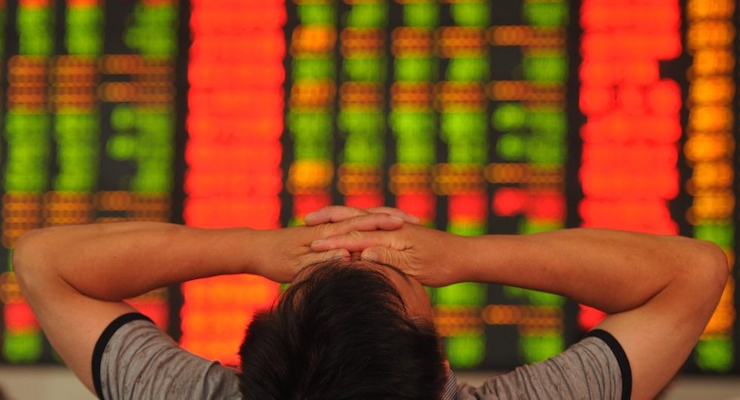

A stock investor reacts as he checks prices in a brokerage house in Fuyang in central China’s Anhui province, 08 July 2015. Chinese stocks plunged on 08 July, with the benchmark Shanghai Composite Index closing down 5.9 percent despite new measures to shore up share prices. The Shanghai Composite Index has tumbled by around 30 per cent since a peak on 12 June. (PHOTO: EPA/AN MING CHINA OUT)
The final hour of trading on Monday tanked the SSE Composite Index (SHA:000001) by levels not seen since 2007 after what was already a deep selloff. The Shanghai Composite Index closed down 8.5 percent at 3,725.56 with most of the plunge occurring in the last hour of trading. Other stock benchmarks around the world also were lower.
In Europe, Britain’s FTSE 100 shed 0.1 percent to 6,573.22 and Germany’s DAX slipped 1.3 percent to 11,198.22. France’s CAC 40 fell 1.3 percent to 4,990.17. On Wall Street, S&P 500 and Dow futures were both down 0.3 percent.
Monday’s fall on the Shanghai market was the biggest one-day decline in Chinese stocks since an 8.8 percent plunge on Feb. 27, 2007, according to financial data provider FactSet. While some market analysts blame investors trading on the margin — essentially creating a natural pullback — the index has shed an aggregate 30 percent in June.
“The continuous check on margin trading by security companies has triggered today’s sell-off,” said Xu Xiaoyu, a market strategist at China Investment Securities. “In addition, the recent economic data shows it still takes time for the economy to recover from its sluggishness.”
Whether Xu has the causes pinned down remains to be seen, but the China sell-off flustered Asian markets, as well as European markets. Only Australia was in the green.
Hong Kong’s Hang Seng (INDEXHANGSENG:HSI) closed 3.1 percent lower, down 776.55 to 24,351.96. Japan’s Nikkei 225 (INDEXNIKKEI:NI225) dropped 194.43, or 1 percent down to 20,350.10, while South Korea’s Kospi fell 0.4 percent to close at 2,038.81. While stocks in Southeast Asia were lower, as well, Australia’s S&P/ASX 200 gained 23.8, or 0.4 percent to 5,589.90.
In currency trading, the euro strengthened to $1.1071 from $1.0991, while the dollar weakened to 123.33 yen from 123.79 yen.
Michael Block, chief strategist at Rhino Trading Partners, had a different take on the sell-off than Xu. Block says the cause of the sell-off remains unclear, as well as how far down the floor for the Chinese stocks really is.
“The best way I can describe what’s going on in China is that authorities are trying to right the ship but they face what I will call an experiential curve. They are trying to see how much and how little they can do and the result is some wild, ungameable swings,” Block wrote in a note to investors early Monday morning. “We are watching crude make a run toward the March lows…And with the fall in commodity prices, the viability of some big, big metals companies is being questioned. I do think we’ll see more casualties in the energy and commodities complexes given the overinvestment and the supply/demand dynamics in each area.”



